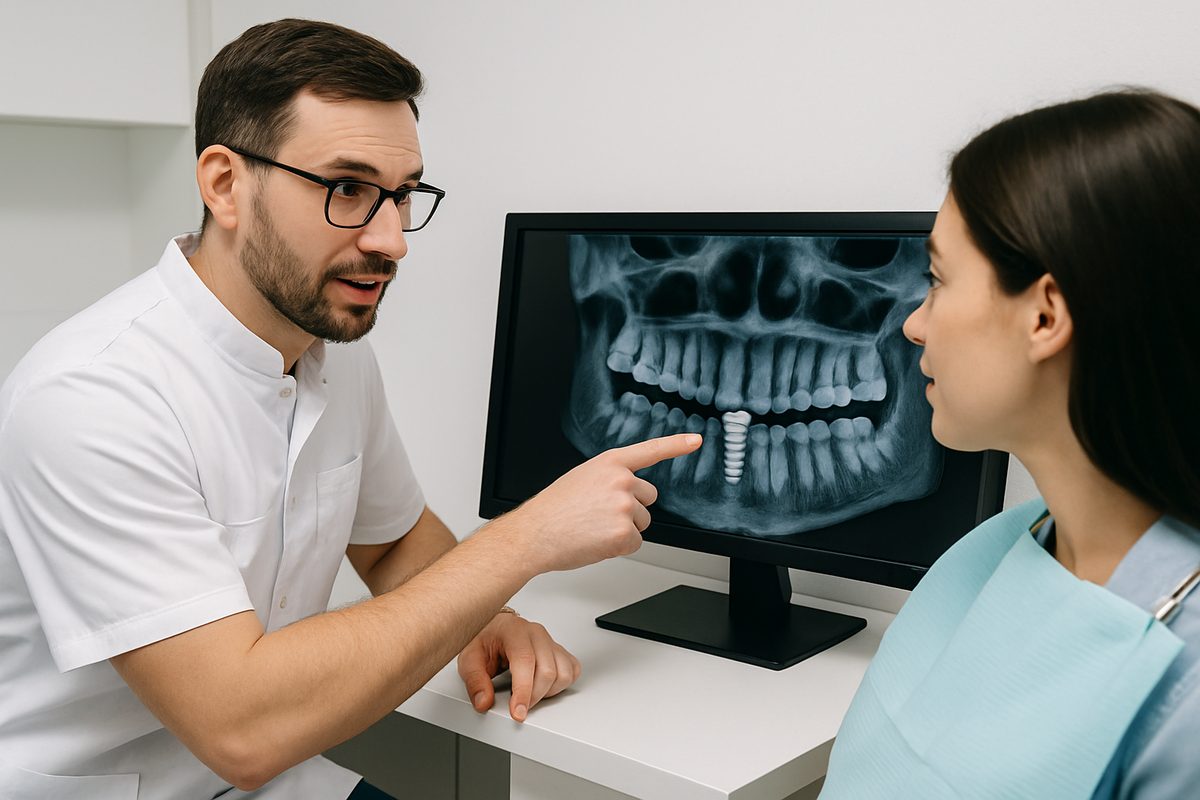If you’re exploring tooth replacement options, this guide lays out clear information about dental implants in Flowood, MS so you can make an informed choice. You’ll read what implants are, who benefits, the steps involved, typical costs, risks, and how to start a consultation. This is practical, local-focused information to help patients in Flowood and the Jackson metro area evaluate implant care.
What Are Dental Implants?
Dental implants are artificial tooth roots made from biocompatible titanium or ceramic that are placed into the jaw to support a crown, bridge, or denture. A standard implant restoration has three parts: the implant (the root), the abutment (the connector), and the crown (the visible tooth). Unlike bridges that rely on neighboring teeth or dentures that sit on the gums, implants replace the tooth root and help preserve bone. For local context, this article provides information about dental implants in Flowood, MS to guide area patients.
Benefits Of Dental Implants
Dental implants restore chewing function and speech, prevent jawbone loss, and look like natural teeth. They are more stable than dentures and often last many years with good care. Implants can improve confidence, eating comfort, and overall oral health. For quick reference, this section provides core information about dental implants so you understand why many people choose them over bridges or removable dentures.
Who Is A Good Candidate?
Good candidates are adults in general good health with adequate jawbone and healthy gums. Non-ideal factors include heavy smoking, uncontrolled diabetes, and severe bone loss; these can increase risk or require additional treatment like bone grafting. Many patients who are not initially ideal candidates can still get implants after preparatory care—such as smoking cessation support, medical management, or grafting—to build a stable foundation.
Types Of Dental Implant Treatments
Single Tooth Implants
Used to replace one missing tooth with a single implant and crown. Pros: preserves adjacent teeth and offers a natural look. Cons: higher cost per tooth compared with a bridge.
Multiple Implants & Implant-Supported Bridges
Two or more implants can support a bridge to replace several adjacent teeth. This avoids grinding down healthy teeth and offers more stability than removable partials.
Implant-Supported Dentures & All-on-4/All-on-X
For patients missing most or all teeth, implant-supported dentures or All-on-4 solutions anchor an arch of teeth to several implants. Benefits include fixed-feeling teeth, better chewing, and faster recovery than full traditional implants for each tooth.
Zygomatic Implants for Severe Upper Jaw Bone Loss
Zygomatic implants are longer implants anchored in the cheekbone for patients with extreme upper jaw bone loss. They’re an advanced option used when regular implants or grafts aren’t feasible.
The Treatment Process & Timeline
Consultation & Digital Planning
Your first visit includes a clinical exam, medical history review, and digital imaging (CBCT, intraoral scans). A detailed treatment plan maps implant positions, timing, and costs. Expect questions about medications, health conditions, and aesthetic goals.
Surgery & Implant Placement
Implant surgery typically involves numbing and optional sedation. The implant is placed into the jaw using surgical guides made from digital planning to improve accuracy. Many patients receive temporary teeth the same day or within a short healing period, depending on the plan.
Healing, Osseointegration, And Final Restoration
After placement, the implant bonds to bone (osseointegration), usually taking 3–6 months. Once healed, the abutment and final crown, bridge, or denture are attached. For local care steps and follow-up, patients can request detailed information about dental implants in Flowood, MS from their provider.
Recovery, Aftercare, And Long-Term Maintenance
Expect mild to moderate soreness for a few days that is managed with pain meds and cold packs. Stick to soft foods initially and keep a gentle hygiene routine. Long-term care includes regular dental visits, daily brushing and flossing, and avoiding tobacco. With proper maintenance, implants have high longevity.
Risks, Complications, And Success Rates
Common risks include infection, implant failure, and nerve or sinus issues. Overall success rates are high—often over 95% for healthy patients—when planning and technique are sound. Watch for signs like persistent pain, swelling, or loose restorations and contact your dentist promptly.
Costs, Insurance, And Financing Options
Single implants can range widely; full-arch solutions cost more and may require extra procedures like bone grafts or sinus lifts. Many insurance plans cover parts of the process but often not the full implant cost. Local clinics often offer financing or payment plans to spread costs. For local pricing and options, ask for specific information about dental implants in Flowood, MS and financing available at area offices.
How To Choose A Dental Implant Provider
Ask about the provider’s training and experience with implants, before-and-after photos, and success with complex cases. Confirm they use digital imaging, intraoral scanning, and surgical guides. Ask about sedation choices and what the full treatment timeline and out-of-pocket cost will be.
About Revive Denture & Implant Studio
Revive Denture & Implant Studio is a Flowood, Mississippi-based center offering handcrafted restorations and digital planning under one roof. The clinic emphasizes patient comfort, sedation options, and financing to help make implant care accessible.
Meet Dr. Joseph Boone
Dr. Joseph Boone, DMD, completed implant residencies and advanced implant training, with credentials in sedation and national fellowship recognition. He treats complex cases, including zygomatic techniques, and teaches implantology, reflecting ongoing training and clinical expertise.
Frequently Asked Questions
– Do implants hurt? Most patients report manageable discomfort after surgery; sedation and pain control are available. – How long do implants last? With good care, many implants last decades. – Are implants covered by insurance? Some plans partly cover implants; confirm specifics with your insurer. – When can I eat normally? Many return to softer foods in days and normal eating after osseointegration and final restoration. – Where can I see before/after photos? Ask the clinic for galleries and video resources to review real patient results.
Next Steps: Scheduling A Consultation
To get personalized information about dental implants in Flowood, MS schedule a consultation with an implant provider. Bring a list of medications, recent X-rays if available, and questions about timeline, costs, and sedation. Call to book an appointment or view the clinic’s video library and gallery to learn more and see patient examples.




